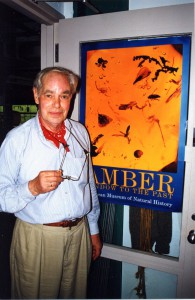Curt W. Beck, a Professor of Chemistry at the undergraduate institution Vassar College, founded the Amber Research Laboratory. Curt is the world’s expert on the analysis of amber and its archaeological interpretation in the Mediterranean world, Europe and Western Asia. He has conducted distinguished research, with a resume including over 150 publications. Curt is an astonishing educator and supporter of his students, forty of whom are co-author on his publications. By colleagues in Europe he is best known as the initiator and chair of the Committee on the Study of Amber in the Union Internationale des Sciences Prehistoriques et Protohistoriques. To American colleagues, he is best known as the chair and editor of the Fifth Symposium on Archaeological Chemistry. As the editor of Art and Archaeology Technical Abstracts, and Chemical Abstracts, the Journal of Archaeological Science, and theJournal of Field Archaeology Curt has championed the cause of archaeological sciences. More recently, he has been faced with the decision to retire but he chose to open a new area of archaeological amber research in China and other countries in East Asia.
Awards
In recognition of his work, Curt W. Beck, Professor Emeritus and Research Professor of Chemistry at Vassar College, was awarded the Pomerance Award for Scientific Contributions to Archaeology in 2001 at the annual meeting of the Archaeological Institute of America—the first time in its 20-year history that this prestigious prize was awarded for work done entirely at an independent undergraduate college, as opposed to a university or a research center. He accepted it on behalf of Vassar College, Edith Stout, and the 80 students who worked with him over the years. The following was Professor Beck’s acceptance speech for the award in 2001:
“ Behind anyone who receives the Pomerance award, there stand a number of invisible and nameless people who were essential in earning it. I am conscious of their presence. But those who have made it possible for me to hold this medal are rathermore numerous than usual, and they are also distinctly different from what you might expect. This is the twentieth Pomerance Award, but it is the first time that it has been given for work done entirely at an independent undergraduate college, as opposed to a university or a research center. So I must first acknowledge the confidence of the grant officers and the referees of a good many private and public foundations, but principally of the National Science Foundation, who gave me the absolutely essential financial support because they shared my conviction that our colleges are not only the breeding grounds that supply well-trained graduate students to our universities, but that they are also places where significant research can be and is being carried on. And I share this award with Vassar College which over the course of forty-three years has given me the time, the equipment, and the students that have made my work possible. One person at Vassar has been too central to be nameless, and that is my colleague Edith Stout who has been my coequal partner for many years. But most especially and remarkably, I share it with more than eighty undergraduate students who have worked with me over the years, often continuously for two or three years and in the summers in between. More than half of them have worked at a level of participation that has deservedly made them coauthors of many of our publications. In the past the Pomerance award has occasionally been given to more than one recipient—once to as many as seven. It took a great many more than that to get the work done for which it is given to me, and it is on their behalf that I am proud to accept it.”
Remembering Curt Beck
Curt Beck was a member in the Department of Chemistry at Vassar College from 1957 until his retirement from teaching in 1993, continuing to work on research with the department until his passing in 2008. On October 29th 2011 a Symposium was held in his honor which featured the following presentations :
David Grimaldi , Chairman of the Department of Entomology, American Museum of Natural History, “Amber: a Window to the Very Ancient Past”
Patrick McGovern, Scientific Director, Biomolecular Archaeology Laboratory, and Adjunct Professor of Anthropology, University of Pennsylvania, “The King Midas’ Funerary Feast: Biomolecular Archaeology and Beyond”
Heather Lechtman ’56, Professor of Archaeology and Ancient Technology, MIT, “Technologies of Power: The Andean Case”

